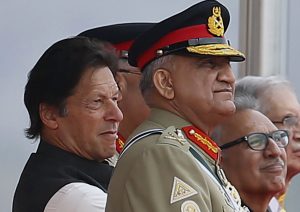In October, the Biden administration told U.S. lawmakers that it was negotiating a deal with Pakistan for the use of its airspace to conduct military and intelligence operations in Afghanistan.
A day later, Pakistan’s Ministry of Foreign Affairs denied any such agreement but said that the two countries “have a longstanding cooperation on regional security and counterterrorism” and “remain engaged in regular consultation.”
The news came weeks after Pakistani Prime Minister Imran Khan said he was “absolutely not” going to allow the U.S. to use Pakistani soil as a base after its pullout from Afghanistan.
U.S. aspirations of using Pakistani airspace for monitoring other countries is not new; it is as old as the relationship between the two countries. The United States was the first country to establish diplomatic ties with Pakistan and the relationship was rooted in military and economic support from the start.
The U.S. first sought to lease Badaber Airbase in Peshawar in the mid-1950s, but it wasn’t until 1960 that Pakistan, then under military dictator Ayub Khan, allowed American spy missions to fly from the Peshawar airbase. One such mission by a U-2 spy plane was shot down by the Soviet Union, inflaming Pakistan-Soviet ties.
Pakistan-U.S. relations received a boost during General Zia-ul Haq’s military regime when the U.S. Central Intelligence Agency and Pakistan’s Inter-Services Intelligence launched Operation Cyclone to thwart Soviet advances into Afghanistan and the region. By 1987, Pakistan became the second-largest recipient of U.S. aid after Israel.
Once the United States decided to abandon Afghanistan after the Soviet withdrawal from that country, Pakistan lost its strategic importance and was slapped with sanctions in 1990 under the Pressler Amendment, which banned major military and economic aid unless Islamabad proved that the funds wouldn’t be used for nuclear proliferation.
The U.S. imposed further sanctions for nuclear tests that Pakistan conducted in 1998 and following the military coup by General Pervez Musharraf in 1999.
But the 9/11 attacks once again propped up Pakistan as a strategic ally for the United States. Initially, Islamabad tried to negotiate a deal between the Taliban, al-Qaida, and the U.S. to hand over Osama bin Laden. When the talks failed, Musharraf became the second Pakistani army chief to allow American forces to use Pakistan’s military bases.
U.S. President George W. Bush lifted all sanctions on Pakistan in October 2002 and entered into new agreements that got Pakistan nearly $12 billion in aid between 2002 and 2008. Musharraf later confessed that the Bush administration had threatened to “bomb Pakistan into the stone age” if it didn’t join the “war on terror.”
Since 2004, the U.S. military has frequently launched airstrikes into Afghanistan and areas bordering the northwestern region of Pakistan, claiming that it was targeting militants. A 2008 diplomatic cable from then-U.S. Ambassador to Pakistan Anne Petterson, released by WikiLeaks, said that about 150 NATO flights crossed Pakistan’s airspace every day.
The year 2011 reset Pakistan-U.S. ties yet again – starting with the Raymond Davis fiasco and followed by the U.S. air raid that killed Osama bin Laden. The U.S. drone strike that killed 24 Pakistani soldiers was the final nail in the coffin, leading to Pakistan ordering the U.S. army to evacuate its Salala Airbase, which was being used to launch offensives against the Taliban.
Islamabad also halted NATO supplies to the U.S. Army for seven months, which was eventually lifted after the then U.S. General John Allen’s visited the Pakistan Army’s General Headquarters (GHQ) and announced $1.1 billion in U.S. aid the same day.
The fresh deal failed to dampen anti-U.S. sentiments in Pakistan that were fueled by the collateral damage of drone strikes. The Bureau of Investigative Journalism statistics show that some 403 U.S. drone attacks have killed over 4,000 across Pakistan.
It was this anti-drone narrative that brought Khan to the corridors of power. His political activists blocked NATO’s supply lines to Afghanistan in November 2013 to end U.S. airstrikes in Pakistan’s tribal belt. Khan ended the protest in February 2014 after the Peshawar High Court ruled that no private individual has a right to block or check the flow of vehicles on roads.
History seems to be repeating itself yet again. The United States has abandoned Afghanistan once again. The Americans expect Pakistan to deal with the aftermath of a decades-long conflict in the region. They are threatening Islamabad with sanctions again.
Yet, unlike the 1990s, the U.S. would prefer a presence in the region to impede growing Chinese and Russian influence.
With a volatile situation in Afghanistan, rising threats from Islamic State Khorasan (ISK), an emboldened Tehreek-e-Taliban Pakistan (TTP), and perpetual tensions with India, Pakistan could do without threats of sanctions looming over its head.
Over two months in power, the Afghan Taliban are struggling to keep the aid-dependent Afghan economy afloat. With the country plummeting into poverty, the new Taliban government not only needs international recognition and aid to survive, but also requires assistance to curb ISK activities in the region.
We already saw the U.S. and Afghan Taliban sharing intelligence input following the attack at the Kabul airport. The U.S. drone strike, however, killed a family, including seven children, instead of ISK terrorists.
In such a scenario, it wouldn’t be a surprise to see Pakistan signing a Memorandum of Understanding (MoU) allowing U.S. access to its airspace in exchange for its assistance in counterterrorism efforts – particularly with the state negotiating its own peace deal with the TTP and other militant groups and help to manage tensions on its eastern border.
Interestingly, if this MoU is signed between Islamabad and Washington, it would be the first of its kind under a democratic government. It would also contradict Khan’s years-long anti-war, anti-U.S. political rhetoric.
This may be why U.S. Deputy Secretary of State Wendy R. Sherman called on Pakistani army chief General Qamar Javed Bajwa instead of Khan to discuss “matters of mutual interest, regional security situation and collaboration in humanitarian measures in Afghanistan” during her October visit to the region.

































